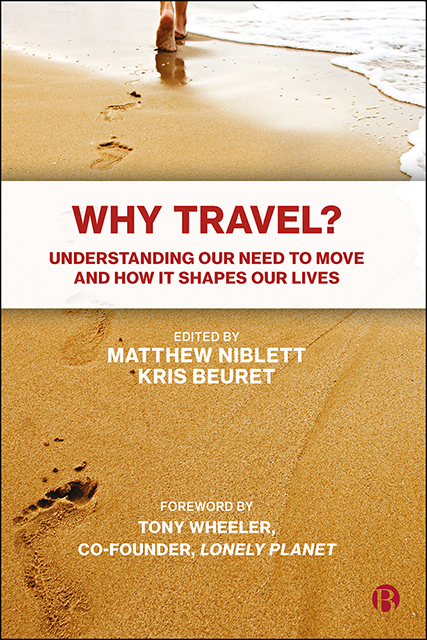Book contents
6 - Why Travel? The Sociological Perspective
Published online by Cambridge University Press: 21 April 2023
Summary
Introduction
In spite of the fact that travel, even to the ends of the earth, has become increasingly routine and involving a much broader spectrum of society, it remains the case that there are mysteries at the heart of it. Differences in the patterns and amount of travel between social groups are of particular interest to sociologists and not simply related to income or wealth but to perception and attitudes. There are many historic examples of taboos against travel by sea, for example the Kala Pani (meaning ‘black water’) which is a taboo in Hindu culture that proscribes against travelling over the ocean. When invited to attend the coronation of King Edward VII in 1902 in London, Madho Singh, Maharajah of Jaipur, overcame this proscription by carrying 8,000 litres of water from the Ganges in his ship. There were similar sea taboos in the Ming dynasty of China where the Confucian bureaucrats forbade overseas travel, Korea was known as the Hermit Kingdom at one time and Tokugawa Japan had also banned overseas travel. On a personal level too, insularity has always had its vocal champions. Sir Thomas Beecham boasted that he had seen a great deal of the world but did not think much of it. Samuel Johnson showed some interest in seeing the Giants’ Causeway but had no desire to travel to see it: ‘Good enough to see but not good enough to go to see’ (Boswell, 1811). In the same spirit Philip Larkin rarely left Hull and if he were urged to see the pyramids or the like would be tempted only if it could be wrapped up in a day. Perhaps the most reduced travel boast belonged to the comedian Peter Cook when nominating his favourite trip as being that to his newsagent and back again.
Reasonable caution you might think but it does raise the question of why people high and low have always been drawn to travel. One set of urges could be labelled cultural, including faith itself, as various ideologies provide a legitimating framework for travel. One of the key cultural appeals of travel lies in seeking a balance between the exotic and the familiar. Escape of various sorts is another drive. This can range from the gap year experiences of college students to refugees in fear of their lives. Lifestyle or role demands point to a third set of explanations.
- Type
- Chapter
- Information
- Why Travel?Understanding Our Need to Move and How It Shapes Our Lives, pp. 99 - 118Publisher: Bristol University PressPrint publication year: 2021

